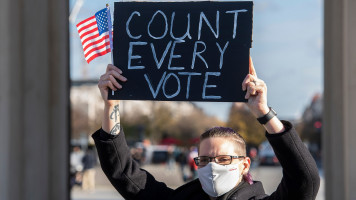Ukraine invasion: President Zelensky visits southern frontline
Ukrainian President Volodymyr Zelensky visited the war-torn southern frontline on Saturday for the first time since the Russian invasion as "fierce battles" raged again in the eastern Donbas region.
Making a rare trip outside Kyiv where he is based for security reasons, Zelensky travelled to the hold-out Black Sea city of Mykolaiv and visited troops nearby and in the neighbouring Odessa region.
Russian forces have directed their firepower on the east and south of Ukraine in recent weeks since failing in their bid to take the capital Kyiv after the February 24 invasion.
"It is important that you are alive. As long as you live there is a strong Ukrainian wall that protects our country," Zelensky told soldiers in the Odessa region.
"I want to thank you from the people of Ukraine, from our state for the great work you are doing, for your impeccable service."
Mykolaiv is a key target for Russia as it lies on the way to the strategic Black Sea port of Odessa. It is around 100 kilometres (62 miles) northwest of Kherson, which fell to Russia in the first weeks of the war.
Zelensky surveyed the badly-damaged regional administration building in Mykolaiv and met officials in what appeared to be a basement where he handed out awards to soldiers, in a video released by his office.
The shockwaves from the invasion of Ukraine continue to reverberate around the world, with the Russian blockade of the port of Odessa blamed for a grain shortage that is fuelling a global food crisis.
Zelensky has appealed for western support and weapons to push out Russian forces and got a boost on Friday when the European Commission backed it for EU candidate status.
He hailed it as a "historic achievement" in his nightly video address late on Friday.
Full membership could take years but the bloc's 27 leaders could add Ukraine to the list of countries vying for membership as early as a summit next week.
The leaders of the bloc's biggest members - France, Germany and Italy - backed the idea during a visit to Kyiv this week, even as fighting rages elsewhere in the country.
The worst of the bloodshed continues to be in the eastern industrial Donbas region, with battles raging in villages outside the city of Severodonetsk, which Russia has been trying to seize for weeks.
"Now the most fierce battles are near Severodonetsk. They (Russia) do not control the city entirely," the governor of the eastern Lugansk region, Sergiy Gaiday, said on Telegram.
Gaiday said there was "more destruction" at the besieged Azot chemical plant in Severodonetsk, where he said 568 people were sheltering, including 38 children.
He also said Lysychansk - a Ukrainian-controlled city across a river from battered Severodonetsk - is being "heavily shelled".
Lysychansk residents were preparing to be evacuated.
"We're abandoning everything and going. No one can survive such a strike," said history teacher Alla Bor, waiting with her son-in-law Volodymyr and 14-year-old grandson.
Pro-Russian officials in the eastern, separatist-held city of Donetsk said five civilians were killed and 12 injured by Ukrainian bombardment.
Moscow has warned against outside involvement in its ex-Soviet neighbour, saying it invaded to "de-nazify and de-militarise" a country that was getting too close to the West.
Russian President Vladimir Putin said on Friday he had "nothing against" Ukraine joining an economic union like the EU, unlike the security risk he sees in Kyiv joining NATO.
But he said EU membership would turn Ukraine into a "semi-colony" of the West.
Putin also insisted that the Russian invasion was not the cause of global inflation and grain shortages, blaming Western sanctions that he said threatened starvation "primarily in the poorest countries".
Russian state television aired social media videos of two US military veterans who went missing last week while fighting alongside the Ukrainian army, stating they had been captured by Russian forces.
US President Joe Biden had said on Friday he did not know the whereabouts of Alexander Drueke and Andy Huynh, after their relatives lost contact with the pair. A third American is also missing.
Ukrainian civilian volunteers however continue to sign up, with a group performing military exercises on Friday in fortified positions left by Russian troops in Bucha, a town synonymous with war crimes blamed on Moscow's forces.
"Most of those who are here aren't soldiers. They're just civilians who want to defend their country - 50 percent of them have never held a weapon until today," a sergeant known as "Ticha" told AFP.
Soldiers in Mykolaiv meanwhile are trying to keep their pre-war routines alive, with one saying he will not give up his vegan diet on the frontlines.
Oleksandr Zhuhan said he had received a package from a network of volunteers to keep up his plant-based diet.
"There was pate and vegan sausages, hummus, soya milk... and all this for free," the 37-year-old drama teacher said happily.
Ukraine is also battling on another front -- the right to host next year's Eurovision song contest after its morale-boosting win this year.
Kyiv condemned a decision by organisers to move the 2023 version of the world's biggest live music event on security grounds, possibly to Britain.





 Follow the Middle East's top stories in English at The New Arab on Google News
Follow the Middle East's top stories in English at The New Arab on Google News


![Algeciras port [Getty]](/sites/default/files/styles/image_330x185/public/75377010.jpeg?h=327453ef&itok=KfCFUEza)